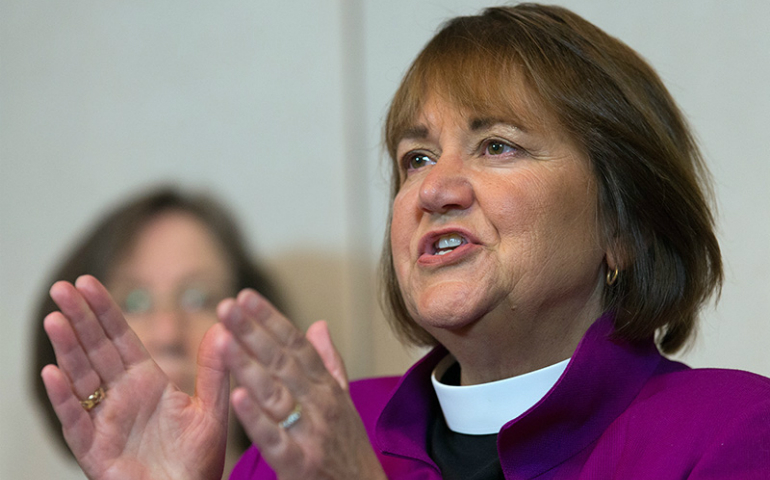
United Methodist Bishop Karen Oliveto talks about the denomination's more than 40-year history of struggle with LGBTQ issues during a press conference following arguments before the church's Judicial Council meeting on April 25, 2017, in Newark, N.J. (UMNS/Mike DuBose)
The United Methodist's top court's decision last week on the consecration of openly gay bishops may have been muddled, but that just shows that the Judicial Council is "a very good representation of the United Methodist Church," said Bishop Karen Oliveto.
"We are not of one mind when it comes the role of LGBTQI people in the life and ministry of the United Methodist Church," Oliveto said.
The 6-3 decision announced April 28 found that while the consecration of an openly gay bishop violates church law, Oliveto's consecration is not in question. She remains a bishop "in good standing" until an administrative or judicial process is finished.
Opponents to Oliveto's election and consecration have said the Judicial Council's decision did not go far enough since it did not remove her from office. Among them, Good News — an evangelical ministry within the United Methodist Church — released a statement calling it "convoluted and ultimately unsatisfactory."
"By allowing Oliveto’s election and assignment to stand, the decision has sown further confusion across the connection," it said.
The second-largest Protestant denomination in the United States has debated the role of LGBTQ people in the church at least since its global decision-making body, the General Conference, first deemed the "practice of homosexuality" to be “incompatible with Christian teaching” in 1972.
At its 2016 quadrennial meeting, the General Conference tasked a 32-member commission appointed by bishops to tackle the issue. The bishops will make recommendations based on the commission's work for the General Conference to act on at a special session in 2019.
While the same debate has vexed the denomination for years, Oliveto said, "what's different is now there's someone in the room."
"It's no longer an issue. It's about people. My presence changes the conversation, and that’s my hope for the commission."
Friday's Judicial Council decision said that while "self-avowal does not nullify the consecration and cause removal from episcopal office," it is enough to subject the bishop's office to review. It also raised the possibility an "openly homosexual and partnered bishop," as well as any clergy who participated in his or her consecration, could be charged with disobedience.
Several complaints — the beginning of judicial proceedings — already have been filed against Oliveto since she was made bishop last July of the Mountain Sky Area, which encompasses Colorado, Utah, Wyoming, Montana and Idaho.
It was just one of several decisions the council made last week impacting LGBTQ clergy. It also ruled the denomination's regional New York and Northern Illinois annual conferences must consider all qualifications of a candidate for ministry. Both previously had decided they would not consider sexuality when evaluating candidates.
"They've made it even tougher for LGBTQI people to serve the church they love — to follow God's call to serve in this church. And it gives anyone the opportunity to file a complaint, to do a witch hunt, to do searches online of marriage certificates. It raises a veil of suspicion on people's humanity, and that's not the gospel," Oliveto said.
"It sends a chilling (message) at a time when more and more people are not having to stay in the closet because society has changed so much."




